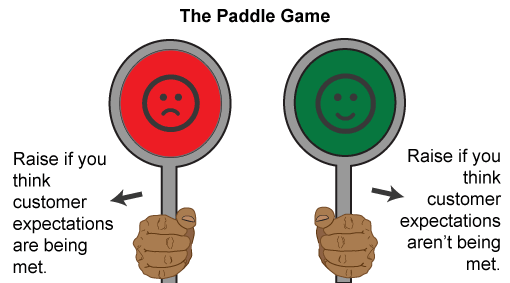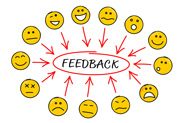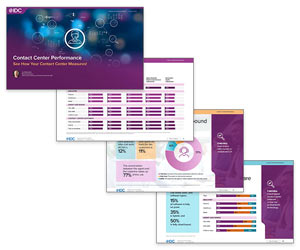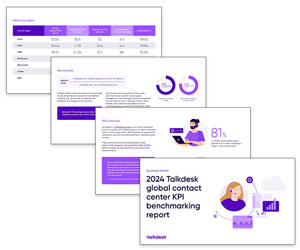We had 59 tips submitted during our webinar on Quality Monitoring and Performance Management. It was more than we could cover in the webinar, so we are publishing them in full here.
1. Target micro-behaviours
The main secret to success in changing micro-behaviours is collaboratively coaching those individuals in such a way that they totally buy in to why this will benefit them, and exactly how they can make that change. – Thanks to Laura
2. Play the “Paddle Game”
At the most basic level, call quality should determine whether the overall impression meets the customer’s expectations.
To get the contact centre team thinking about this, in my contact centre we would have two little wooden paddles, one would have a green smiley face and one would have an unhappy sad face.
What we would do at the end of the interaction is I would just have everybody hold up one of the panels was it the happy face or was it the unhappy face, and that was our litmus test for we think overall it meets or it does not meet expectations.

Also, this game makes for a little bit of fun and builds really great conversation on what your overall impression is. – Thanks to Justin Robbins
3. Share great customer service experiences
A good tip is that we get our colleagues to listen to their calls as individuals and within their team to share great customer service experiences and not so great ones. – Thanks to Zoe
4. Get agents involved in the process
Listen to the agents. Get them involved in process and implementation and use their feedback to process as a team. – Thanks to Nicola
Find out how to include agents in other contact centre related duties, by visiting our page: Involve Agents in Operations and Strategy
5. Define what good call monitoring looks like

Call monitoring will not be effective unless you fully understand the reason for monitoring and what you are trying to measure or discover. Identifying what ‘good’ or ‘unsatisfactory’ looks like is essential for objective and effective call monitoring. ‘Good’ will be different depending on the reason for monitoring. – Thanks to Janette
6. Let the agent select the calls
Ask the agent to supply one call that they think is an excellent call and one that didn’t go so well. The agent then takes ownership and also highlights strengths and weakness. – Thanks to Heather
7. Use a risk score
We use a risk score to allocate QA call listening. This ensures that the people with the biggest issues get the most support. – Thanks to Andrew
8. Put outcomes against all interactions
Put text outcomes against all interactions to enable focus where it is needed without having to listen to or read each interaction. Outcomes can be sorted by type and campaign (for example, all sales calls which did not result in a sale are tagged with a reason why. This highlights all of your agents’ sins and needs! – Thanks to Simon
9. Make Key Performance Indicator (KPI) targets visible

Make all KPI targets visible to all advisors, alongside their own achievements. Allow the advisors the knowledge to understand their own development needs and encourage them to approach the manager for help. It should not be the manager approaching the non-performing staff. – Thanks to Simon
For more information on KPIs and how they may actually harm agent engagement, read our piece: Key Performance Indicators (KPIs) Are Damaging Employee Engagement
10. Let the Quality Team remove bias
Be careful when setting quality goals for managers if they are responsible for monitoring their own team’s calls, unless a quality team is in place to ensure the manager is being unbiased in his or her scoring. Managers may inflate scores to ensure they meet the goal set regardless of true observations. – Thanks to Annette
11. Have 360-degree marking
We employ a 360-degree marking process, where agents, team leaders and customer service managers all mark the same call. The process is discursive, allowing agents to influence the score and therefore improving their buy-in, especially when it comes to taking on feedback. – Thanks to Richard
12. Keep checking performance
Constantly look at your performance monitoring again and again to ensure it’s achieving the desired result. – Thanks to Enoch
13. Check for customer impact

Customer impact should always be the highest point of the reason for monitoring. – Thanks to Kevin
14. Develop a sense of trust in the QA system
Techniques in communication and communication style, and their consistency are vital to developing trust or a sense of fairness in the QA system and feedback. So communicate the QA style between agents and QA staff or team leaders. – Thanks to Sladjana
15. Keep it simple
Monitor from customer perception. Monitor advisor behaviour, efficient call management, best contact resolution, above & beyond, internal processes. – Thanks to Kevin
16. Engage the team
Engage your team in coming up with the quality monitoring. This means they understand it, buy into it and provide it to the customers. – Thanks to Andrew
Follow the link to discover the 5 Principles for Developing Employee Engagement
17. Provide immediate feedback

Provide feedback after every call, which gives the agent an opportunity to improve their score before the next call is monitored. – Thanks to Jo Joscelyn
18. Everyone is their own worst critic
Get the agents to listen and monitor themselves. Everyone is their own worst critic. This helps them to focus on what they do well and where they feel they need improvement. It also allows them to accept praise better. – Thanks to Crystal
19. Do quality monitoring together
A way to improve the quality of an agent’s call is to have the agent listen to a call and do the quality monitoring together with the manager. This makes them aware what we pay attention to and they will less likely make the same mistake. – Thanks to Simmi
20. Increase the sample size only for under-performers
To coach effectively, you only need to increase sample size for under-performers. – Thanks to Simon
21. Record calls in the background

Remove agents’ stress from call monitoring by using a solution which records quietly in the background, without influencing the behaviour of the individual under assessment. – Thanks to Cameron
[In one call centre I went to the agents knew they were being monitored when the supervisor put her headset on – editor]
For more information, visit our page: Recording Calls In Contact Centres
22. Let agents critique their own calls
This allows them to take ownership of their own performance and encourages development not only of their own techniques, but also of their ability to understand the requirements of them and the impact this has on the business. – Thanks to Lindsay
23. Check the call notes
When we monitor a call we also look at the notes that were placed for the call to make sure all points were touched upon and see if anything else could have been done to help our customer. – Thanks to Karina
24. Do it weekly
We monitor calls on a weekly basis and coach within the next week before a new call is monitored, so the agent has the opportunity to improve before the next call is monitored and graded. – Thanks to Karina
25. Keep someone off the phone

We forecast staffing to include one member of the team constantly off the phone for coaching, so performance management is not affected by busy periods. – Thanks to Simon
26. Bonus based on YTD performance
We now measure and pay bonus against year to date performance against annual targets, so performance daily/weekly/monthly performance changes are not missed. – Thanks to Simon
27. Trust agents to score their own work
Ultimately, entrust your agents to “score” their own work. – Thanks to Simon
28. Keep Quality Assurance consistent
Standards should be the same for all calls, so one call should be an indication of performance. – Thanks to Simon
29. Allow self-assessment

Gain “buy-in” from your teams by allowing agents to self-assess some of their work – make them feel their input is valued and that your team ethos is inclusive. – Thanks to Cameron
30. Use QA training
QA managing training is great. There is direct feedback as far as issues that we see while in production, and it can be enforced for new hires or refresher trainings. – Thanks to Caroll
31. Let the agents listen to calls
Allow agents to listen to the calls during coaching sessions. It is a great opportunity to point out strengths and areas of opportunity. Sometimes it helps to paint the picture. – Thanks to Annette
32. Never tell the agent
It seems obvious, but we never tell the agent. We allow them to listen, reflect and ask questions for them to draw out the idea/development area for themselves. – Thanks to Rebecca
33. Don’t rush it

I never allow an agent to leave a coaching session until they are 100% on board with the goals. They can see the benefit, can see clearly where they need to be, how they will get there and how I will help them get there (if required). – Thanks to Rebecca
34. Tell or grow?
Learn what coaching method suits the individual agent – some may prefer a ‘tell’ session, whereas others may prefer a ‘grow’ session. – Thanks to Gareth
35. Work across teams
Get one of the agents you monitor to complete call monitoring for one of the other teams on a regular basis. Everybody could get their turn. This could be very beneficial. – Thanks to Anne.
36. Agents need to know how they impact the team
Advisors need to understand their own impact on team/dept. results, and ultimately they need to realise HOW they can change their behaviour to improve their results – understanding is key to buy-in, and buy-in is key to achievement. – Thanks to Simon
Follow the link to read a collection of articles on empowering agents
37. Build Customer Feedback into the Quality Assurance process

Incorporate customer feedback into performance measures and bonus schemes and direct the feedback to the individual advisors. Often what the customer thinks is more important to the advisor than what their managers think. – Thanks to Simon
38. Encourage ‘WOW’ calls
We have incentives each month for ‘WOW’ calls. These can be things like bond vouchers or a half-day leave etc. – Thanks to Gareth
39. Keep Quality Assurance calibrated
Put in place a minimum monthly calibration with all supervisors. – Thanks to Brenda
40. What is working for the top performers?
Ask top performers what is working for them and why? Take this information and devise a training plan especially for new advisors or to use as retraining aid. – Thanks to Tracy
41. Do it immediately

Immediate feedback and two way discussion between supervisor and agent on calls listened to. – Thanks to Brenda
42. Pair good and bad agents
Pair agents with both good and bad quality providers. This makes sure the good agents teach the bad to perform better from a quality perspective. – Thanks to Jonas
43. Let agents do their own scoring
Allow the agent to score one or more of their own calls during their one-to-one meeting. This will ensure that they are aware of exactly what is expected of them and also will give them an opportunity to review their own performance and benchmark performance.
This has been tried and tested and I have received positive feedback from supervisors and agents. – Thanks to Michelle
Fin out how to create quality scores through gamification, in our article: An Introduction to… Gamification
44. Cross-examine call observations
Allow supervisors to cross-examine each other’s call observations. For example, supervisors can monitor samples of another team’s call observations instead of just listening to their own team’s calls. This will help to rule out ‘bias’ monitoring. – Thanks to Michelle
45. Score what is important to the customer

Ensure that your call observation form is not so much focused on the expectation of what you think is important but what is actually most important to your customer.
For example, you may focus on an area of call observation that is not that important to your customer. Make sure that you know what your customer expectations are, so that this can be measured when monitoring agent calls. This will maximise customer satisfaction. – Thanks to Michelle.
46. KPIs drive behaviour
The correct KPIs that sit behind this to drive the right behaviour/mission goal. – Thanks to Gareth
47. Monitor advisor cultures
Advisors should be focused on the customer’s end product and exceeding their expectations. Good quality will follow. – Thanks to Kevin
48. Ask ‘what did you like about that phone call?’
I get the call advisor to listen to their call/s and give their assessment about it first, before I start on my assessment.
I ask ‘what did you like about that phone call?’ and ‘what would you change on that phone call?’ Sometimes we might re-script parts of the call that could be improved, so they can try a different approach the next time they’re in that situation. – Thanks to Kiryn
49. Get the small things right

Regular monitoring is a good way of maintaining best practice, ensuring advisors get the details right: greeting consumers appropriately, adhering to the laid-down call structure, and using agreed positive phases throughout the call.
With regular quality monitoring, you can prevent bad habits creeping in, spreading from advisor to advisor, and contact centre to contact centre. Regular monitoring, support, feedback and training all help you maintain your high standards.
50. The 80% rule
Every agent has one call/piece of work monitored per week. If the score is less than 80% then a second call/piece of work will be completed. – Thanks to Donna
51. How many advisors meet their KPIs?
Don’t just measure your achievement against KPIs. Also measure the percentage of advisors who are achieving them. – Thanks to Simon
52. Involve the agent in the entire call monitoring process
Coaching and feedback will allow the agent to remember and embed the information because they are involved in the ENTIRE process. – Thanks to Lauren
53. Accentuate the positive

Understandably, we have to report on our findings when monitoring, which sometimes can include errors. However, we find it useful to always highlight positive points, which instils confidence and motivation. – Thanks to Catherine
54. Let agents grade their own calls
We also have agents listen to the calls we have reviewed and we get them to grade their own calls. Then we compare results and we often find the agent is harder on themselves. – Thanks to Shelly
55. Employ a QA analyst
We have a QA analyst who evaluates the calls and then the agent’s immediate supervisor is responsible for the performance piece. – Thanks to Melissa
56. Let the team listen to their own work
We have been giving the team the opportunity to listen and assess some of their own work so they can identify development areas and work with their coaches and team leaders. – Thanks to Leigh
57. Let agents listen to top performers

We have given agents the option to listen to top performers’ calls to gain knowledge, ideas and improve their own performance. – Thanks to Tracy
58. Pick on areas where they are doing well
To help performance, don’t just pick up on areas that need possible changing etc. Pick up with them when you have identified an area that they are doing particularly well in and give positive feedback too.
This will empower them and make them want to put that across in other areas. It should enable them to then ask the manager/team leader what areas they need to work on to improve as they will want the positive feedback building their confidence. – Thanks to Tracy
59. Look at multi-skilled feedback
In many contact centres the work is multi-skilled and the team does a number of different things. For instance, our sales team deals not only with incoming sales, but also with retention, outbound calling and cancellations. My manager and I (team leader) monitor not only the incoming sales calls, to identify problem areas and staying compliant, but also all other areas to see if advisors need more coaching in specific areas.
This can then be built on. For example, if an advisor is not confident on selling against other companies to retain the customer, we then go over all the key areas in what we can do for that customer and sell our products over those of other companies. – Thanks to Tracy
For more on the topic performance management and quality, read our articles:
- What Is Performance Management? With a Definition, Best Practices and Common Misconceptions
- 10 Ways to Improve Call Centre Performance Management
- 14 Tips for Collecting Advisor Feedback
Author: Jo Robinson
Published On: 26th Sep 2012 - Last modified: 30th Jun 2022
Read more about - Hints and Tips, Coaching, Key Performance Indicators (KPIs), Measurement, Performance Management, Quality









































very help full
How to deal with the agent who don’t co operate? suggest me on this
Lesson To improve
Let the agents lesson (Good call)and bad call
Agents on Calibration
Let agents be involved in weekly calibration for them to understand how they are being scored.
it was very good
I think agents should be involved to make this better
Great information. I am brainstorming on how to improve my company’s current call quality model. This Article has helped! Wonderful resource!
Holding 10 minute refreshers every week (particularly on slower days), this could help boost morale along the way.